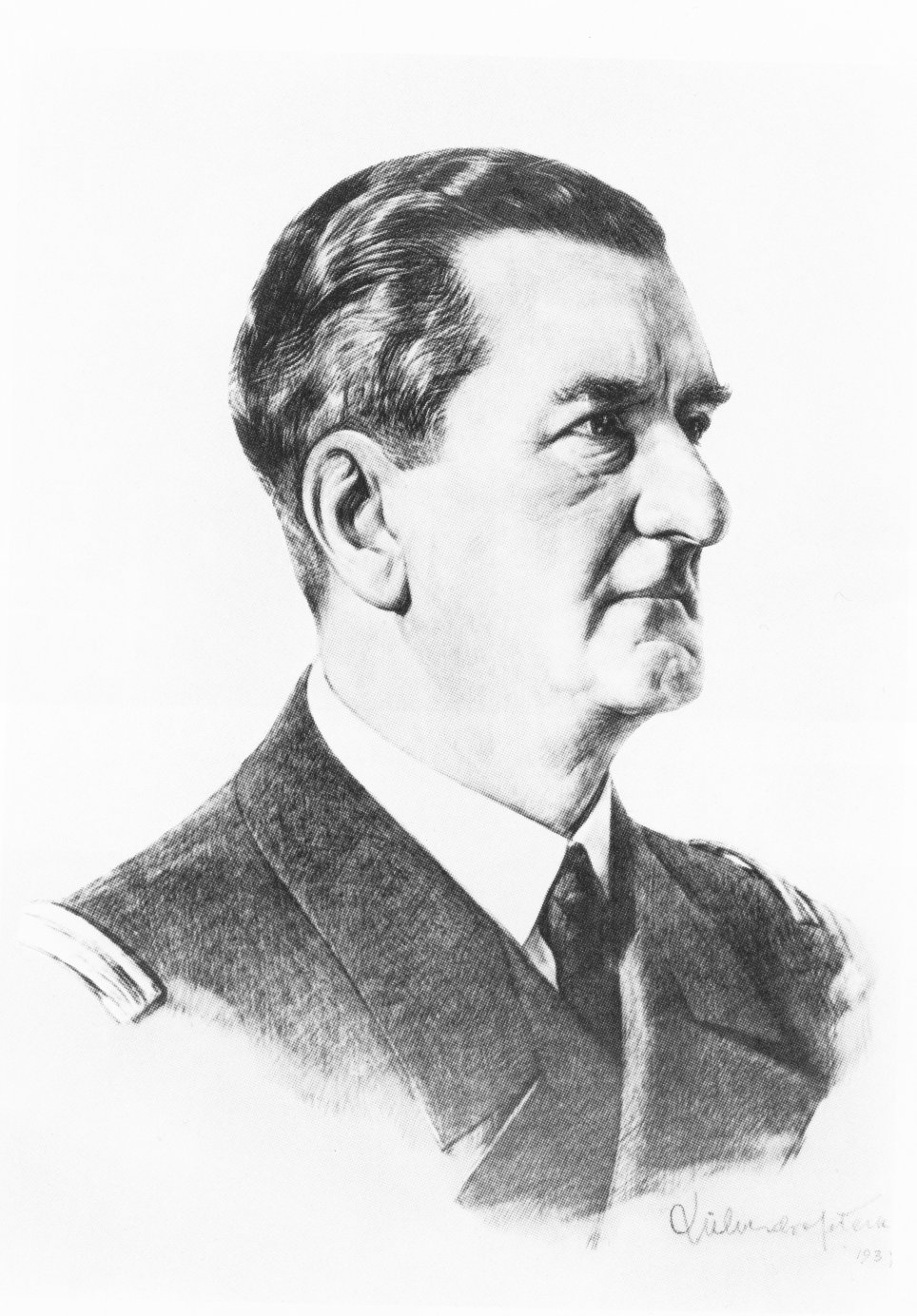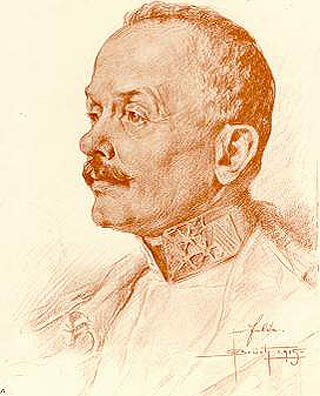Against the popular belief the situation of the Austro-Hungarian empire could be seen as very good for the public in the summer of 1918. The Empire had two won peace-treaties (Ukrainian, Romanian) and her troups plied in foreign lands.
But the leaders already knew that they are before the moments which will decide the final result of the war. The spirit, the moral of the army is definitely not same like was in 1914, desertions in daily basis, and the elite team, the fleet rises in February. It is obvious for the decision makers that a great win can restore the sprit and the moral of the army, but the plans of the great attack in Italy - under the pressure of the German Chief Generals - became ready only in June. King Charles and the most part of the generals were not happy with the decision of the attack, they knew the greatness of the pot.
These facts make very interesting the "battle" of the chief-commandant Svetozar Boroevic and Miklós Horthy. The story was published by the expert of the Austro-Hungarian Army, prof. dr. Károly Csonkaréti at the beginning of the 90s.

Horthy Miklós. Drawing by
Lühnsdorf Károly, 1937. |

Svetozar Boroevic,
Drawing by Oskar Bruch 1915. |
In 1918 the 50 year old Miklós Horthy ship-of-the-line captain were promoted as rear-admiral and the chief of the fleet by King Charles on 27th February.. The promotion was the merit of his military activity : he anticipated 11 admirals and 24 older ship-of-the-line captains - not accidentally. Against his predecessors, the 60 year old Maximilian Njegovan and the 67 year old Anton Haus admirals, the new chief had offensive spirit and he was enough brave to organize very naughty military actions.

The K.u.K Navy Harbor in Pola. Detail of the very valuable collection by Frigyes Schoch at fortepan.hu.
On 5th Apr. József Veith ship-of-the-line lieutenant with his sailors debarked in Ancona, to spy into the new Italian weapons. The brave sailors were on the way back when they were recognized and captured. (To be exact, the Italians recognized them earlier many times, but they thought that the Italian-speaking sailors in Austro-Hungarian uniform are Englishmen. There is no mistake: the brave sailors wear their own uniform in the Italian navy-base.)
This incident had a consequence which became very serious later: :the chief of the base, Luigi Rizzo corvette captain is to correct this error, otherwise will be court-martialed.
In May Horthy sends his friend, the chief officer of the navy, Emil Konek de Norwall ship-of-the-line captain to Udine and he offers a very remarkable plan for general Svetozar Boroevic, the chief-commander of the army by Isonzo.

Emil Konek, 1907. as legate in the peace conference at Hague.
The basics of this plan :
- On the coast and on the river Pó ships armed with artillery 30,5 and 24 give help to the land maneuvers, this also means a suprise stab in the back,
- Meanwhile the fleet attacks the blockade of the entente in Otranto and breaks it up .
For the point 1, there were available 6-7 m shallow draught ships with suitable armour, like Kaiser Karl VI, and Sankt Georg.

SMS Sankt Georg, next to it SMS Kaiser Karl VI.

Seine Majestet Schiff Kaiser Karl VI.
Emil Konek wrote his memories with very kind and gentle style, but it can be read between the lines: Boroevic rejects the first point without hesitation and thinking. The 62 years old general, who made real safe the Italian front-line with his defense tactics, should be the member of the group,where we can find the members as irritated by the "young" chief navy commandant and by his "rough" ideas. He told to Emil Konek that he would find the ship artillery as a good help, but he would not have claim on them, because the submarines and the mortar bombs destroy the ships. Emil Konek Emil tried to use "professional arguments": Anti-mortar bomb ships can be used and the fleet is able to stall off the submarines -his arguments were ignored. Boroevic might was nervous and replied : he does not need any help, the attack will be successful.
He accepted the second point - which did not play any serious role in this attack - and "he wished good luck for the 'young, well-known navy chief-officer " (Words of Emil Konek, which samples the real opinion of Boroevic.)
The summary of the result of the attack on the Piave by Károly Csonkaréti : "Boroevic badly lost the battle between 15-22 June with 150.000 deads." Horthy wanted to execute the attack with the Szent István battleship in the Otranto - but the battleship was sunk by Luigi Rizzo hence he saved to be court-martialed.
The political events about the battle of Piave are also cautionary. In the Parliament Nándor Urmánczy delegate (whose castle will be known in October) interpellated Sándor Szurmay Minister of Defense, mentioning the lieutenant who escaped and betrayed the plan, and he said : "... the forwarding troups reached the lines which were intact and saved from any artillery activity hence behind these lines there were Italian and English troups ready for counter attack." and he closed his sentences with these words: "We are ready and will fight until the last piece of our blood. But this needs the end of the unplanned and flighty activity. There is only one solution : detonating the Austrian Chief-Office!". About this, Sándor Wekerle, premier minister just said: "About this investigation, I would like to note, that this kind of investigations should be not run public!."
Miklós Horthy was be able to "amortize" Boroevic's "loan" only 35 years later. Horthy writes in his memories: the handover of the fleet to the Yugoslavian National Comitte was an idea of some Croatian generals - but really this idea was presented by count Gyula Andrássy Jr. The First World War was -yet - a battle between knights and gentlemen - and the low blow is not allowed in the world of the knights and a gentlemen does not suffer an abuse.

SMS Sankt Georg, next to it SMS Kaiser Karl VI.

Seine Majestet Schiff Kaiser Karl VI.
Emil Konek wrote his memories with very kind and gentle style, but it can be read between the lines: Boroevic rejects the first point without hesitation and thinking. The 62 years old general, who made real safe the Italian front-line with his defense tactics, should be the member of the group,where we can find the members as irritated by the "young" chief navy commandant and by his "rough" ideas. He told to Emil Konek that he would find the ship artillery as a good help, but he would not have claim on them, because the submarines and the mortar bombs destroy the ships. Emil Konek Emil tried to use "professional arguments": Anti-mortar bomb ships can be used and the fleet is able to stall off the submarines -his arguments were ignored. Boroevic might was nervous and replied : he does not need any help, the attack will be successful.
He accepted the second point - which did not play any serious role in this attack - and "he wished good luck for the 'young, well-known navy chief-officer " (Words of Emil Konek, which samples the real opinion of Boroevic.)
The summary of the result of the attack on the Piave by Károly Csonkaréti : "Boroevic badly lost the battle between 15-22 June with 150.000 deads." Horthy wanted to execute the attack with the Szent István battleship in the Otranto - but the battleship was sunk by Luigi Rizzo hence he saved to be court-martialed.
The political events about the battle of Piave are also cautionary. In the Parliament Nándor Urmánczy delegate (whose castle will be known in October) interpellated Sándor Szurmay Minister of Defense, mentioning the lieutenant who escaped and betrayed the plan, and he said : "... the forwarding troups reached the lines which were intact and saved from any artillery activity hence behind these lines there were Italian and English troups ready for counter attack." and he closed his sentences with these words: "We are ready and will fight until the last piece of our blood. But this needs the end of the unplanned and flighty activity. There is only one solution : detonating the Austrian Chief-Office!". About this, Sándor Wekerle, premier minister just said: "About this investigation, I would like to note, that this kind of investigations should be not run public!."
Miklós Horthy was be able to "amortize" Boroevic's "loan" only 35 years later. Horthy writes in his memories: the handover of the fleet to the Yugoslavian National Comitte was an idea of some Croatian generals - but really this idea was presented by count Gyula Andrássy Jr. The First World War was -yet - a battle between knights and gentlemen - and the low blow is not allowed in the world of the knights and a gentlemen does not suffer an abuse.

Nincsenek megjegyzések:
Megjegyzés küldése